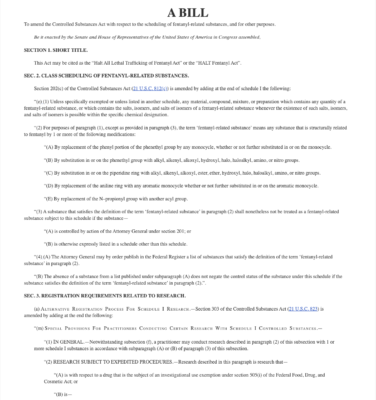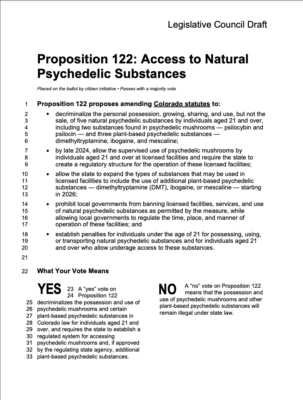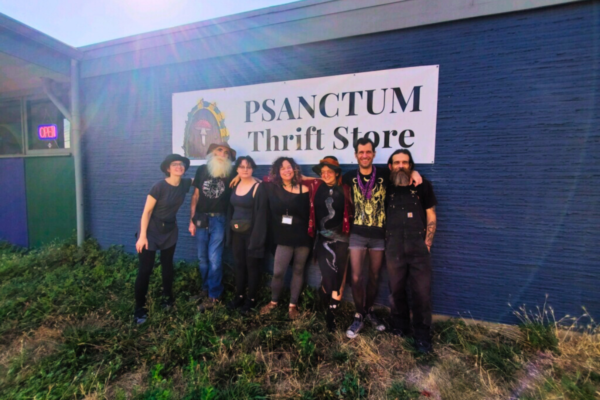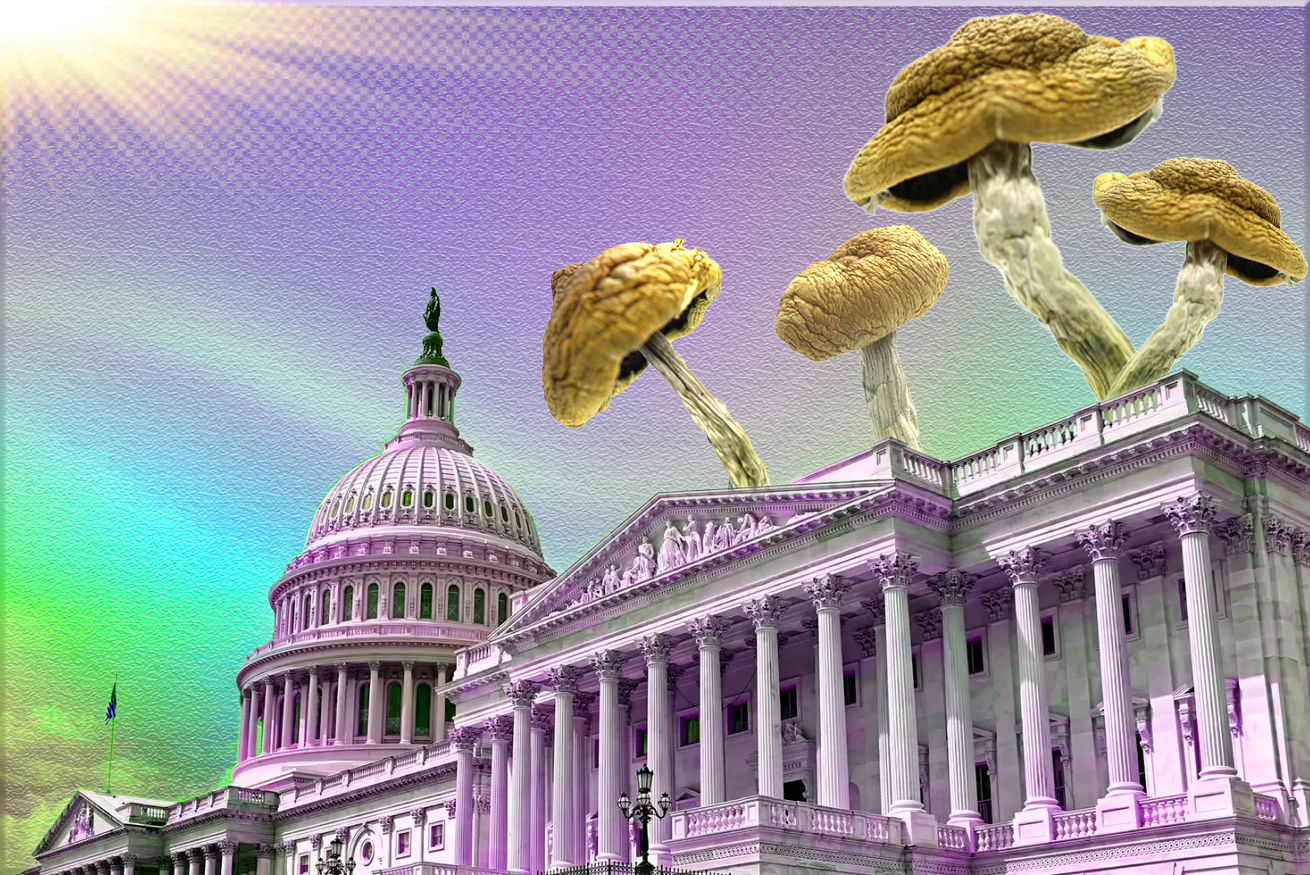
Welcome to this week’s roundup of noteworthy news regarding psychedelics. This edition features a variety of topics, such as Field Trip downsizing, a congressional committee approving a bill aimed at streamlining research into marijuana and certain psychedelics, Oregon granting the first US psilocybin manufacturing licenses, and more.
Field Trip Announces Layoffs, Clinic Closures & Creditor Protection

Field Trip Health & Wellness Ltd. (TSX-V: FTHW) has announced that, in an effort to “reduce expenditures and preserve capital”, it will be closing Field Trip Health Centers located in Chicago, Washington DC, Seattle, San Diego and Fredericton. According to the company, the anticipated last day of operation for each of these locations will be on or around April 15, 2023.
Patients in each of these locations will be receiving notice of clinic closures which will at least include some information on finding alternative care providers, in addition to how they can access their medical records and other information required by applicable laws and regulations.
A Canadian court granted the Field Trip Health & Wellness protection from creditors under the country’s Companies’ Creditors Arrangement Act (CCAA). The Canadian CCAA provides something of an alternative to bankruptcy which allows debtor companies to remain in operation.
The company has a 10-day shield from creditors to present its reorganization (beginning 3/23/2023). Public documents show Field Trip Health & Wellness will seek additional stays in legal proceedings as part of its reorganization efforts.
It also says it carried out a “companywide” reduction impacting an unspecified number of corporate and clinical staff, and chairman and chief executive Ronan Levy stepped down.
Trading in the company’s securities has been suspended and its common shares are being transferred to the NEX Board of TSX Venture Exchange during the suspension period.
This news comes as many tele-therapy businesses, psychedelic focused or not, grapple with the incoming expiration of the USA’s COVID-19 Public Health Emergency Act.
On February 24, 2023, the Drug Enforcement Administration (DEA) proposed rules addressing the prescribing of controlled substances via telemedicine upon the scheduled end of the COVID-19 Public Health Emergency (PHE) on May 11, 2023.
Generally, the Ryan Haight Act requires providers perform an in-person medical evaluation of a patient prior to prescribing a controlled substance unless an exception applies. Relevant here is the exception for treatment that occurs during a PHE, allowing for the prescribing of a controlled substance without the prerequisite of an in-person medical examination of the patient.
Bill Approved by Congressional Panel to Streamline Psychedelics Research
A congressional committee has approved a bill that aims to ramp up criminalization for fentanyl-related substances, while also streamlining research into Schedule I drugs like marijuana and certain psychedelics.
The legislation, sponsored by Rep. Morgan Griffith (R-VA), passed the House Energy & Commerce Committee with amendments on 3/23/2023.
H.R. 467, or the Halt Fentanyl Act, has received mixed feedback from those who oppose an overall ‘war on drugs’, as its main thrust is permanently placing fentanyl and its analogues in the strictest schedule and enhancing penalties for activity related to the opioid substances.
However, other provisions of the bill that aim to expedite registrations for studies into Schedule I drugs and allow for limited manufacturing by researchers could address some concerns surrounding how the strict classification of marijuana, psychedelics and other substances has impeded science.
“Scheduling fentanyl-related substances should not be a political issue,” Rep. Bob Latta (R-OH) said at the committee markup last week. “Protecting and ensuring the safety of our communities is the reason we are all here in Congress, and working to eradicate the scourge of fentanyl in order to save lives should be one of our top priorities.”
He acknowledged concerns about the potential consequences of the legislation on research objectives, saying that it “specifically includes a carve-out that enables researchers to continue studying Schedule I substances for the purposes of identifying potential medical benefits.”
The legislation goes on to say that “a person who is registered to perform research on a controlled substance may perform manufacturing activities with small quantities of that substance…without being required to obtain a manufacturing registration, if such activities are performed for the purpose of the research and if the activities and the quantities of the substance involved in those activities.”
The measure also states that research that’s being conducted or funded by federal agencies like the U.S. Department of Health and Human Services (HHS) wouldqualify for expedited processing.
First US Psilocybin Manufacturing Licenses Granted in Oregon

The Oregon Health Authority (OHA) has granted the nation’s first-ever psilocybin production license for the supply of state-supervised psychedelic therapy service centers to the woman-owned Satori Farms PDX LLC.
The psilocybin mushrooms produced at this facility will provide the necessary supply for businesses to offer supervised psychedelic experiences in the near future.
Several psilocybin worker permits have been granted so far and many more applications have been submitted to the state’s regulating agency.
Nonetheless, several issues remain, including local access following decisions on moratoriums or bans, high service costs and the unavailability of funding, which recently led to the closure of the facilitators’ training program Synthesis Institute.
Senate Committee Approves Psychedelics Advisory Board Nominees in Colorado
Senators at the Finance committee have given initial approval to the 15 nominees forming the Natural Medicine Advisory Board tasked to oversee the state’s legalized access to psilocybin mushrooms through advising the Department of Regulatory Agencies (DORA) in the development of rules and regulations for the new “healing centers.”
After the unanimous vote to advance the nominations, the group must now be confirmed by the full Colorado Senate.
DORA executive director Patty Salazar stated that, of the initial 226 people applying to be part of the advisory board, the preliminary group of appointees constitutes “a complete puzzle,” as it includes representatives of the 12 categories requested by Prop 122.
Governor Jared Polis’ office has refused to provide media access to any of his appointees, citing the need to protect their credibility before they can be approved by the Colorado State Senate. This is a critical step in ensuring that those appointed are qualified for their roles and able to serve Colorado effectively.
On March 14th, fifteen of Polis’ nominees gave their first public statements during the Senate Finance Committee hearing and were quickly endorsed by unanimous vote for advancement to the entire Senate.
The nominees are Skippy Upton Mesirow, David Lucero, Clarissa Pinkola Estés, Katina Banks, Billy Wynne, Alisa Hannum, Tina Ernestine Gonzales, Ricardo Baca, Lundy Nelson, Joshua Goodwin, Wendy Buxton-Andrade, William Dunn, Suzanne Sisley, Bradley Connor, and Sofia Chávez.
State of Washington Amends Psilocybin Research Bill, To Re-Add Patient Provisions
A House committee in Washington State has amended and approved a psilocybin bill, inserting some therapeutic access provisions back into the legislation after the Senate had stripped it down to focus on research only.
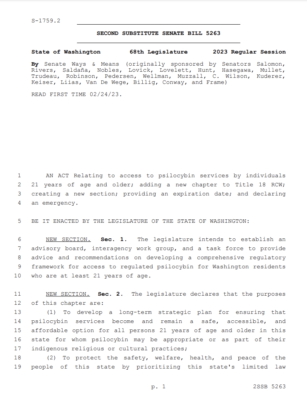
“The bill as it stands takes very thoughtful steps towards a way that we as a state can consider a regulatory framework,” Macri said before the vote. “I like that the advisory group will come back with recommendations to the legislature next session and that, with this pilot that we have added to it, can gain more insight into the applicability of this service.”
“You know, this bill started out in the Senate in a far more ambitious way,” she added.
SB 5263 was originally introduced by Sen. Jesse Salomon (D) as a measure to allow adults to 21 and older to lawfully use psilocybin in a supervised setting. But those provisions were gutted by a Senate committee in February that approved a hasty substitute bill from another Democrat, Sen. Karen Keiser.
Macri’s amendment nudges the measure back toward more immediate legal access, at least slightly.
“I thought we heard incredibly compelling testimony during the hearing about the potential benefits of psilocybin services,” she said Wednesday, “particularly as they apply to people who have experienced trauma or depression that is difficult to treat.”
The panel approved two separate amendments from Macri before advancing the bill. The first change adjusts the makeup of a proposed psilocybin advisory board to include two more individuals: a military veteran or veterans’ representative as well as someone who’s a social worker, mental health counselor or marriage and family therapist.
Massachusetts Lawmaker Files a Law to Cap the Costs of MDMA Therapy

Bay Staters for Natural Medicine, a grassroots community group with more than three thousand volunteers across New England, has worked with five city councils to pass measures decriminalizing psychedelic plants, including psilocybin mushrooms. Now the group has set its eyes on another goal: ensuring that psychedelic treatments are kept affordable for residents in the future.
A Republican State Representative, Nick Boldyga of Massachusetts’ Third Hampton District, has just filed HD2137, which will automatically reschedule MDMA if the federal government approves it for treating PTSD. Unlike similar legislation passed in Colorado, however, this legislation will put a price cap of $5,000 on these treatments. This price cap will be put in place to keep care affordable, since approval of MDMA by the Food and Drug Administration (FDA) will give a single corporation the exclusive right to sell the treatments for six to twelve years per the New York Times.
It’s important to consider that MAPS is currently planning to charge $15,000 or more for each MDMA treatment if it is given exclusive rights to sell it under FDA exclusive authorization.
“We have countless PTSD-afflicted veterans struggling to just survive financially. The MAPS corporation is using these veterans to push for a monopoly. And they’re admitting that only the richest of the rich will be able to afford MDMA treatment. It’s sickening,” remarked Mike Botelho, a disabled Marine Corp Veteran, and a founder of New England Veterans for Plant Medicine.
